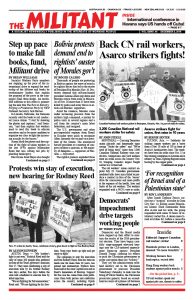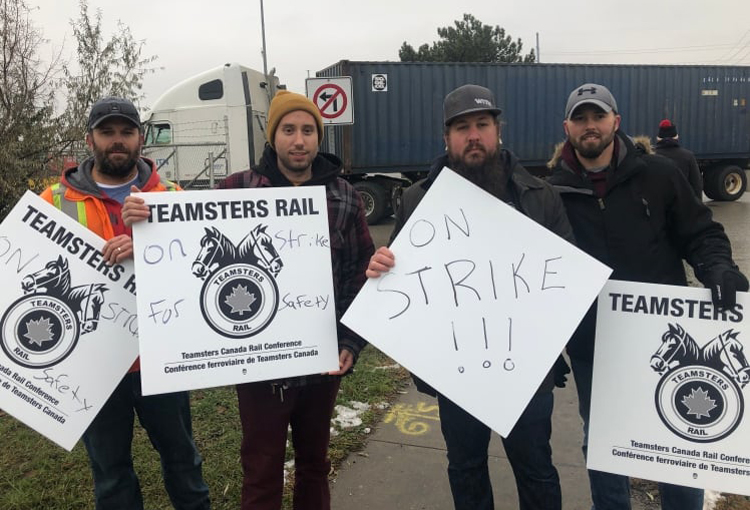MONTREAL — Carrying Teamsters union placards and homemade signs saying “Strike for safety” and “We’re tired of being tired,” more than 3,000 Canadian National Railway train conductors, trainpersons and yard workers went on strike across the country Nov. 19, bringing Canada’s largest freight carrier to a virtual halt.
The rail workers’ union contract expired July 23. Canadian government-mediated talks have since failed to produce a contract in face of the bosses’ drive for concessions and more profits at the expense of the health, lives and limbs of the rail workers. The workers responded with a 99.2% vote to strike. The walkout is the first strike on Canadian National in a decade.
Among the concessions the bosses demand are reduced rest periods and increases in the amount of time workers can be forced to work overtime during a shift. They want to make it harder for workers to take time off.
Use of dangerous remote control operations in rail yards is another major safety issue. The union is fighting CN bosses forcing workers to hang on “to moving trains with one hand while operating a remotely controlled locomotive with the other.”
The company is demanding other concessions, including a lifetime cap on prescription drug coverage.
The day before the strike deadline Canadian National bosses announced they plan to cut 1,600 jobs — both office and union — out of its North American workforce of 24,000. The union rejected CN’s demands for binding arbitration and pressure from government officials not to strike. The two sides are continuing to negotiate in Montreal.
“We’re tired of working tired,” Teamsters Canada Rail Conference spokesman Daniel Walter told Canadian Broadcasting reporters on the picket line in Calgary Nov. 19. “We’re constantly hauling dangerous products through highly populated areas, and we need to be rested. All this while CN made over $3.8 billion last quarter.”
The federal Transportation Safety Board said fatigue was a major safety problem in 90 investigations of derailments and other incidents it has conducted since 1992. Striking rail workers are saying, “Enough is enough.”
Fifty percent of all merchandise in Canada moves by rail. Canadian bosses’ outfits like the Chemistry Industry Association and the Mining Association are pressing Justin Trudeau’s Liberal Party-led government to order rail workers back to work. The bosses’ demands are backed by the provincial governments in Alberta and Saskatchewan. Some grain is being moved by management personnel, but thousands of additional tons are stuck in storage.
Western Canadian governments, oil bosses and others demand Trudeau cut off the strike.
Three strikes by rail workers on the Canadian Pacific — the country’s second largest freight carrier — since 2012 were halted when the government enacted or threatened back-to-work legislation.
Trudeau’s minority government rules with support from the New Democratic Party, which says it will not support legislation to end the strike. His party lost the popular vote in the country and was routed in the west in the Oct. 21 federal elections.


